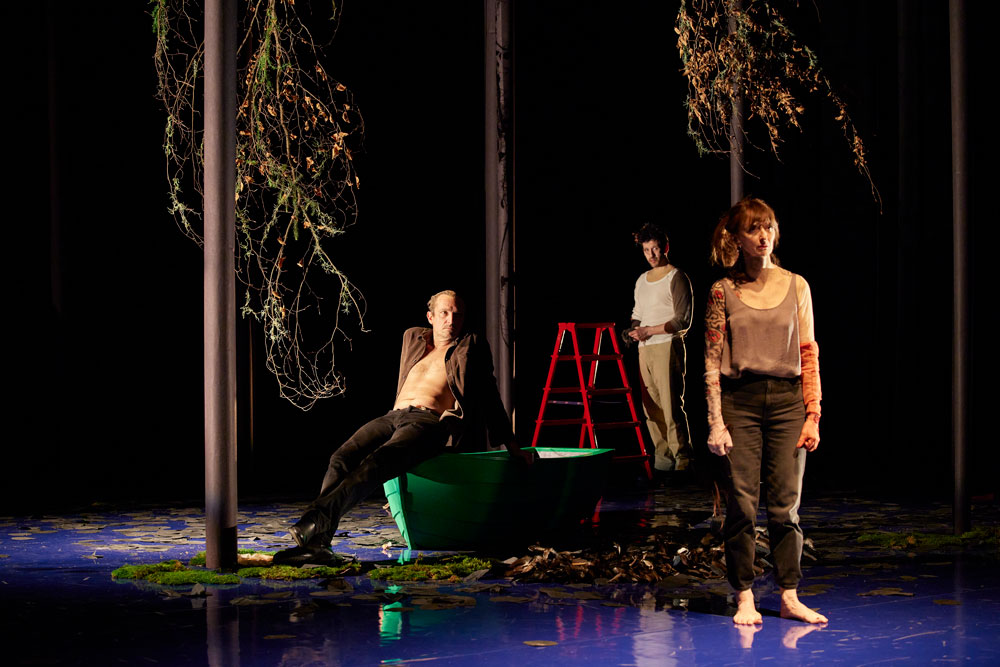________
the company day-for-night
It exits books and enters the body – Mathieu Riboulet
The company day-for-night was created in 2000 in the region of Île-de-France and moved to Franche-Comté in 2007. It is directed by Anne Monfort and seeks to develop forms that combine visual and textual, fictional and documentary, the precision of the actor’s performance and an in-depth dramaturgy. Inspired by the Nouveau Roman or new novel and French New Wave, the company’s shows provide clues that make it possible to create a fictional story without following it from beginning to end, particular states of presence, coexistences of fragmentary and sometimes contradictory textual elements. The theatre is seen as a place where thought can be organised and aesthetic impact can occur, a place where intimacy and politics can be articulated.

Morgane Poulette – création 2017 © Patrice Forsans
The company’s first shows (Dieu est un DJ in 2002, Tout. En une nuit. in 2005, Sous la glace in 2007 and Nothing hurts in 2008) were created from texts by the German author Falk Richter, for whom Anne Monfort is also the translator. In parallel to this long collaboration with Richter, she has created text montages, as well as performance-like forms. She has also worked on site-specific shows, such as Next Door (2009), which took over empty flats before they were rented out, or specific installations such as Les fantômes ne pleurent pas (2012), in which the spectators do not attend the same show depending on which side they are on. During this process, a precise directing style was developed, working according to a system of cinematographic editing, where the actor is the bearer of the change in form – it is the change in the code of acting that makes the whole performance shift from documentary to fiction, from political to poetic. This work was undertaken through the director’s collaboration with loyal actors, by honing the prosody, with breaks and changes in the register that shift the show into another genre. This was the case for Black house (2014), Temps universel +1 by Roland Schimmelpfennig (2015), Morgane Poulette (2017).
The company has also teamed up with the author Sonia Willi, to set up an in-depth collaboration between script and stage writing, and with her created Quelqu’un dehors moi nulle part in March 2012 at the Halle aux Grains-Scène nationale de Blois, as well as the short play EXIT in 2013 for Festival 360 in Montreuil. In 2014, she rejoined Falk Richter for Et si je te disais, cela ne changeait rien, a work based on unpublished material from his journals. She then commissioned Mickael de Oliveira, a Portuguese author, and Ulrike Syha, a German author, to write No(s) révolution(s), a work for which a historian joined them. The day-for-night company has been working with the author Thibault Fayner, for whom it created Morgane Poulette, and who is working on a new play.
Working on literary material, particularly novels, is a long-term project for the company. Since its move to Franche-Comté, day-for-night has collaborated with Agence Livre et Lecture for stage readings and has therefore met many authors.
In Perséphone 2014 after Gwenaëlle Aubry (2016), Désobéir- Le monde était dans cet ordre à quand nous l’ont trouvé, after Mathieu Riboulet (2018), and Pas pleurer after Lydie Salvayre (2019), novels have enriched the show’s text but also its scenic dimension, combining literary and textual materials and other elements in harmony.

Nostalgie 2175 – création 2022 © Christophe Raynaud de Lage
The most recent productions also explore the dialogue between languages and their relationship to history. No(s) révolution(s), created with two French actors, a German actress and a Portuguese actress, was performed and broadcast in the three corresponding countries in 2016, with a focus on languages that changed from one country to another. Morgane Poulette combines French and English in their musicality as well as in the subject matter, which uses the city of London as a fictional territory. Pas pleurer is a mixture of Catalan, Castilian and French. Désobéir-Le monde était dans cet ordre-là quand nous l’ont trouvé also deals with the failure of a specific European construction, between the 1970s and today, seeking ‘a little politics between’. La méduse démocratique (2018) features the figure of Robespierre coming to discuss the current political situation with the audience. Anja Hilling’s Nostalgia 2175 (2022) does the opposite, looking at history through the future.
This detailed work on the texts is combined with research into linking words and music, to create a sensitive relationship with the spectator. This explains Anne Monfort’s regular collaborations with composers such as Loïc Guénin and Núria Gimenez Comas. The company also develops the precision of the actors’ work through research projects such as Opération Caravage and Fantasticalité, which are free of production constraints and to which the company dedicates specific time.
The company also has partnerships with higher education institutions (ESAD, CNSAD, TNS), the training of young actors being an angle that particularly interests director Anne Monfort. In 2019, Anne Monfort and Thibault Fayner created the graduation show for the students of EDT 91, Les médaillons. In 2021, Anne Monfort directed the CNSAD students’ graduation show, based on Nulle part, an unpublished text by Kouam Tawa. More generally, support for young companies is important to the company, which therefore accompanies up-and-coming teams in the form of mentoring or sponsorship.

Nulle part de Kouam Tawa, mis en scène par Anne Monfort avec la promotion 2021 du CNSAD © Christophe Raynaud de Lage
day-for-night is subsidised by the DRAC Bourgogne Franche-Comté and by the Bourgogne-Franche-Comté region. The company is supported in its projects by the Departmental Council of Doubs and the City of Besançon.
